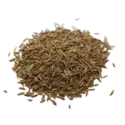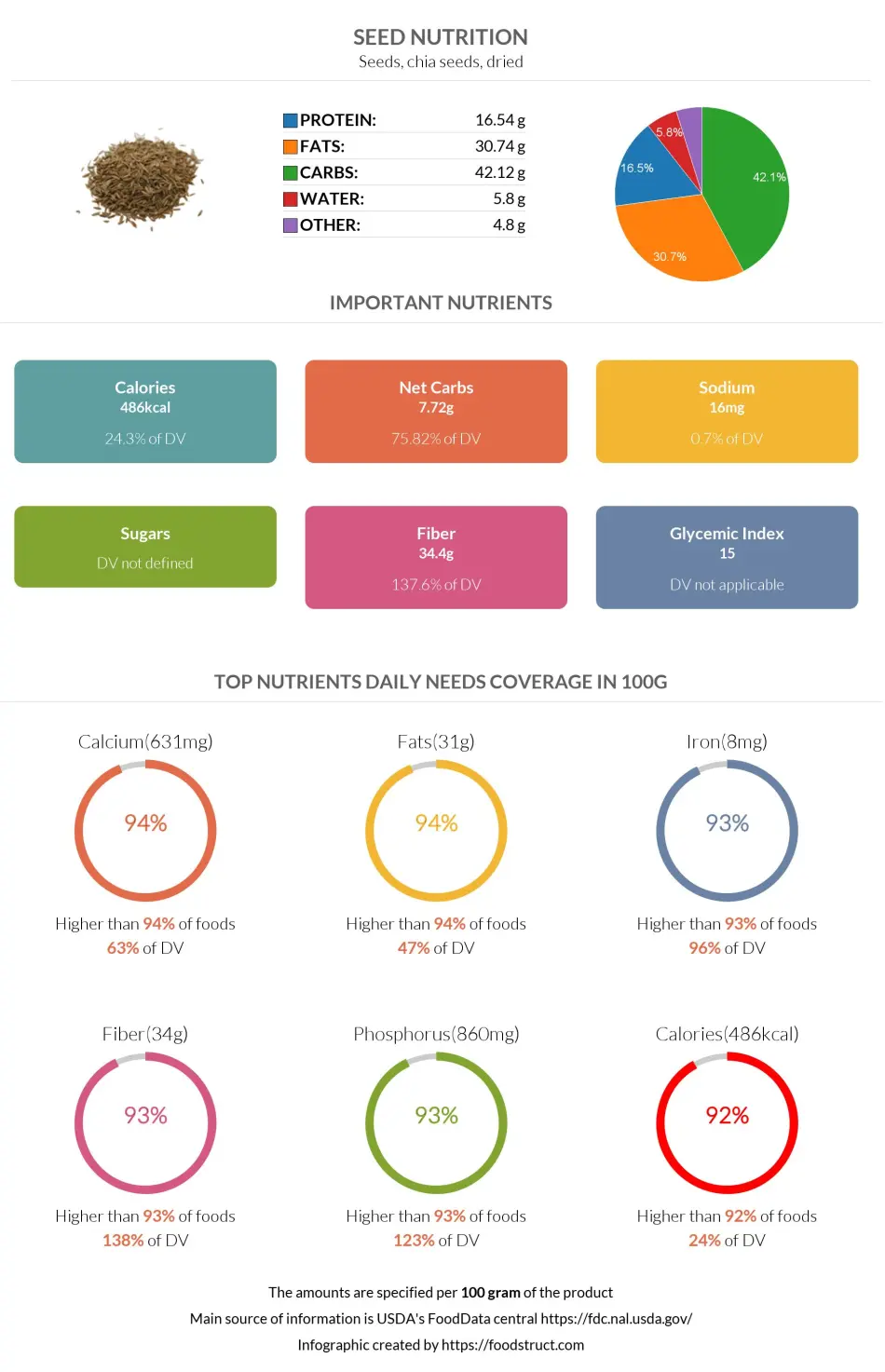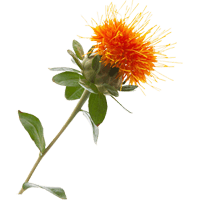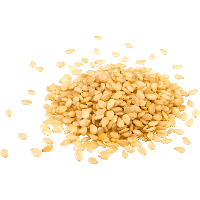Chia seeds nutrition: calories, carbs, GI, protein, fiber, fats
Seeds, chia seeds, dried
Top nutrition facts for Chia seeds

| Calories ⓘ Calories for selected serving | 138 kcal |
| Glycemic index ⓘ Gi values are taken from various scientific sources. GI values less than 55 are considered as low. Values above 70 are considered as high. | 15 (low) |
| Net Carbs ⓘ Net Carbs = Total Carbohydrates – Fiber – Sugar Alcohols | 2 grams |
| Default serving size ⓘ Serving sizes are mostly taken from FDA's Reference Amounts Customarily Consumed (RACCs) | 1 oz (28.35 grams) |
| Acidity (Based on PRAL) ⓘ PRAL (Potential renal acid load) is calculated using a formula. On the PRAL scale the higher the positive value, the more is the acidifying effect on the body. The lower the negative value, the higher the alkalinity of the food. 0 is neutral. | 14.5 (acidic) |
Fats ⓘHigher in Fats content than 94% of foods
Calcium ⓘHigher in Calcium content than 94% of foods
Fiber ⓘHigher in Fiber content than 93% of foods
Iron ⓘHigher in Iron content than 93% of foods
Phosphorus ⓘHigher in Phosphorus content than 93% of foods
Chia seeds calories (kcal)
| Calories for different serving sizes of chia seeds | Calories | Weight |
|---|---|---|
| Calories in 100 grams | 486 | |
| Calories in 1 oz | 138 | 28.35 g |
| Calories for different varieties of chia seeds | Calories | Weight |
|---|---|---|
| Seeds, chia seeds, dried (this food) | 486 | 100 g |
| Seeds, breadfruit seeds, boiled | 168 | 100 g |
| Seeds, breadfruit seeds, raw | 191 | 100 g |
| Seeds, breadfruit seeds, roasted | 207 | 100 g |
| Seeds, breadnut tree seeds, raw | 217 | 100 g |
| Seeds, cottonseed flour, low fat (glandless) | 332 | 100 g |
| Seeds, cottonseed flour, partially defatted (glandless) | 359 | 100 g |
| Seeds, breadnut tree seeds, dried | 367 | 100 g |
| Seeds, cottonseed meal, partially defatted (glandless) | 367 | 100 g |
| Seeds, cottonseed kernels, roasted (glandless) | 506 | 100 g |
Chia seeds Glycemic index (GI)
Gi values are taken from various scientific sources. GI values less than 55 are considered as low. Values above 70 are considered as high.
Mineral coverage chart
Mineral chart - relative view
Vitamin coverage chart
Vitamin A:
0µg of 900µg
0%
Vitamin E:
0.43mg of 15mg
2.8%
Vitamin D:
0µg of 20µg
0%
Vitamin C:
1.4mg of 90mg
1.5%
Vitamin B1:
0.53mg of 1mg
44%
Vitamin B2:
0.14mg of 1mg
11%
Vitamin B3:
7.5mg of 16mg
47%
Vitamin B5:
0mg of 5mg
0%
Vitamin B6:
0mg of 1mg
0%
Folate:
42µg of 400µg
10%
Vitamin B12:
0µg of 2µg
0%
Choline:
0mg of 550mg
0%
Vitamin K:
0µg of 120µg
0%
Vitamin chart - relative view
Macronutrients chart
Protein:
Daily Value: 9%
4.7 g of 50 g
4.7 g (9% of DV )
Fats:
Daily Value: 13%
8.7 g of 65 g
8.7 g (13% of DV )
Carbs:
Daily Value: 4%
11.9 g of 300 g
11.9 g (4% of DV )
Water:
Daily Value: 0%
1.6 g of 2,000 g
1.6 g (0% of DV )
Other:
1.4 g
1.4 g
Protein quality breakdown
Tryptophan:
371mg of 280mg
132%
Threonine:
603mg of 1,050mg
57%
Isoleucine:
681mg of 1,400mg
49%
Leucine:
1166mg of 2,730mg
43%
Lysine:
825mg of 2,100mg
39%
Methionine:
500mg of 1,050mg
48%
Phenylalanine:
864mg of 1,750mg
49%
Valine:
808mg of 1,820mg
44%
Histidine:
452mg of 700mg
65%
Fat type information
Saturated fat:
0.94 g
Monounsaturated fat:
0.65 g
Polyunsaturated fat:
6.7 g
Fiber content ratio for Chia seeds
Sugar:
0 g
Fiber:
9.8 g
Other:
2.2 g
All nutrients for Chia seeds per selected serving size (1 oz - 28.35g)
| Nutrient | Value | DV% | In TOP % of foods | Comparison |
| Calories | 138kcal | 7% | 8% |
10.3 times more than Orange
|
| Protein | 4.7g | 11% | 32% |
5.9 times more than Broccoli
|
| Fats | 8.7g | 13% | 6% |
1.1 times less than Cheese
|
| Vitamin C | 0.45mg | 1% | 38% |
33.1 times less than Lemon
|
| Net carbs | 2.2g | N/A | 50% |
7 times less than Chocolate
|
| Carbs | 12g | 4% | 23% |
1.5 times more than Rice
|
| Cholesterol | 0mg | 0% | 100% |
N/A
|
| Magnesium | 95mg | 23% | 9% |
2.4 times more than Almonds
|
| Calcium | 179mg | 18% | 6% |
5 times more than Milk
|
| Potassium | 115mg | 3% | 17% |
2.8 times more than Cucumber
|
| Iron | 2.2mg | 27% | 7% |
3 times more than Beef broiled
|
| Fiber | 9.8g | 39% | 7% |
14.3 times more than Orange
|
| Copper | 0.26mg | 29% | 17% |
6.5 times more than Shiitake
|
| Zinc | 1.3mg | 12% | 21% |
1.4 times less than Beef broiled
|
| Phosphorus | 244mg | 35% | 7% |
4.7 times more than Chicken meat
|
| Sodium | 4.5mg | 0% | 82% |
30.6 times less than White bread
|
| Vitamin E | 0.14mg | 1% | 57% |
2.9 times less than Kiwi
|
| Manganese | 0.77mg | 34% | 27% | |
| Selenium | 16µg | 28% | 21% | |
| Vitamin B1 | 0.18mg | 15% | 14% |
2.3 times more than Pea raw
|
| Vitamin B2 | 0.05mg | 4% | 54% |
1.3 times more than Avocado
|
| Vitamin B3 | 2.5mg | 16% | 14% |
1.1 times less than Turkey meat
|
| Vitamin B12 | 0µg | 0% | 100% |
N/A
|
| Trans fat | 0.04g | N/A | 60% |
106.4 times less than Margarine
|
| Folate | 14µg | 3% | 35% |
1.2 times less than Brussels sprouts
|
| Saturated fat | 0.94g | 5% | 35% |
1.8 times less than Beef broiled
|
| Monounsaturated fat | 0.65g | N/A | 50% |
4.2 times less than Avocado
|
| Polyunsaturated fat | 6.7g | N/A | 9% |
2 times less than Walnut
|
| Tryptophan | 0.12mg | 0% | 43% |
1.4 times more than Chicken meat
|
| Threonine | 0.2mg | 0% | 68% |
Equal to Beef broiled
|
| Isoleucine | 0.23mg | 0% | 67% |
1.1 times less than Salmon raw
|
| Leucine | 0.39mg | 0% | 68% |
1.8 times less than Tuna Bluefin
|
| Lysine | 0.27mg | 0% | 71% |
2.1 times more than Tofu
|
| Methionine | 0.17mg | 0% | 59% |
6.1 times more than Quinoa
|
| Phenylalanine | 0.29mg | 0% | 54% |
1.5 times more than Egg
|
| Valine | 0.27mg | 0% | 65% |
2.1 times less than Soybean raw
|
| Histidine | 0.15mg | 0% | 67% |
1.4 times less than Turkey meat
|
| Omega-3 - ALA | 5.1g | N/A | 78% |
2 times more than Canola oil
|
| Omega-6 - Linoleic acid | 1.7g | N/A | 81% |
2.1 times less than Almonds
|
Check out similar food or compare with current
NUTRITION FACTS LABEL
Nutrition Facts
___servings per container
Serving Size ______________
Serving Size ______________
Amount Per 100g
Calories 138
% Daily Value*
13%
Total Fat
8.7g
4.3%
Saturated Fat 0.94g
0
Trans Fat
0g
0
Cholesterol 0mg
0.2%
Sodium 4.5mg
4%
Total Carbohydrate
12g
39%
Dietary Fiber
9.8g
Total Sugars 0g
Includes ? g Added Sugars
Protein
4.7g
Vitamin D
0mcg
0
Calcium
179mg
18%
Iron
2.2mg
27%
Potassium
115mg
3.4%
*
The % Daily Value (DV) tells you how much a nutrient in a serving of food contributes to a daily diet. 2,000 calories a day is used for general nutrition advice.
Health checks
ⓘ
Dietary cholesterol is not associated with an increased risk of coronary heart disease in healthy individuals. However, dietary cholesterol is common in foods that are high in harmful saturated fats.
Source
Low in Cholesterol
ⓘ
Trans fat consumption increases the risk of cardiovascular disease and mortality by negatively affecting blood lipid levels.
Source
No Trans Fats
ⓘ
Saturated fat intake can raise total cholesterol and LDL (low-density lipoprotein) levels, leading to an increased risk of atherosclerosis. Dietary guidelines recommend limiting saturated fats to under 10% of calories a day.
Source
Low in Saturated Fats
ⓘ
While the consumption of moderate amounts of added sugars is not detrimental to health, an excessive intake can increase the risk of obesity, and therefore, diabetes.
Source
Low in Sugars
Chia seeds nutrition infographic

Infographic link
References
All the values for which the sources are not specified explicitly are taken from FDA’s Food Central. The exact link to the food presented on this page can be found below.


